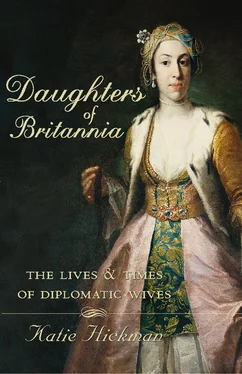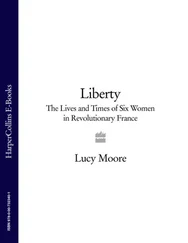Later on, when Mary had learnt Persian and was in a better position to form an opinion, she conceded that the Persian women were both lively and intelligent. ‘They are restless and intriguing, and may be said to manage their husband’s and son’s affairs. Persian men are made to yield to their wishes by force of incessant talking and teazing,’ she noted, a frisson of disapproval in her voice. The Shah’s mother in particular – ‘very handsome, and did not look above 30 but must be 40’ – was very clever: not only was she in complete charge of the harem itself; it was also said that she played a large part in the affairs of government.
The Khanum (the Lady), as she was known, received Mary kindly. She said ‘a great many aimiable things to me and went through all the usual Persian compliments, hoping that my heart had not grown narrow and that my nose was fat.’ Mary was entertained lavishly, and the Khanum asked her many questions about Queen Victoria: how she dressed and how many sons she had. She even made her describe the ceremonial of a Drawing Room, and a visit to the theatre. And yet despite these overtures, ‘various circumstances render it undesirable to form an intimacy with the inmates of any Persian anderoon,’ Mary wrote primly. ‘If it were only on account of the language they are said to be in the habit of using in familiar intercourse among themselves, no European woman would find any enjoyment in their society.’
This memsahib-like prudery condemned Mary to a life of splendid isolation. At first she was amused by the way in which her escort seized any men who came too close to her and pushed their faces up against the wall until she had passed lest she should be ‘profaned’ by their glance. But once established at the mission Mary was allowed nowhere, not even for a drive, without an escort of fifteen or twenty armed horsemen. This was not so much for security, for Persia was a safe country, ‘but that dignity so required’.
Since she could take no part in her husband’s public life, almost her only pleasures were her pets, letters from home, which arrived just once a month, and her garden. At first she found the garden a melancholy place, full of lugubrious cypresses, in which ‘the deserted, neglected little tombs of some of the children of former ministers occupied a prominent place’, filling her with gloomy forebodings. But with the help of a Mr Burton, a first-rate English gardener who at that time was in the service of the Shah, she was soon astonishing everyone with the beauty of her celery and her cauliflowers, ‘for these useful edibles occupied my mind more than flowers.’ 1 To be thrown back on her own resources in this way, albeit in the humble cultivation of a vegetable patch, was to prove an invaluable training for the real hardships that she was later to face.
In the mid-nineteenth century there was nothing, and no one, to tell Mary Sheil what living in Persia was going to be like. While various forms of military and diplomatic intelligence existed for the use of Colonel Sheil and his colleagues, the female, domestic sphere was never considered important enough to merit attention. As a woman, and as a European, Mary was doubly isolated.
Present-day Foreign Office wives (and now of course Foreign Office husbands as well) may consult a well-developed system of post reports to tell them exactly what to expect when they arrive in a new country, from schools for their children to whether or not Marmite can be bought in Azerbaijan (it can’t). But knowing the theory, of course, does not necessarily make the practice any easier.
Sometimes even the most basic physical conditions, such as the weather, can be the most daunting. Extremes of heat and cold (-45°C in the harshest Mongolian winters; +45°C in the hottest central Asian summers), of humidity or altitude, are only partly alleviated by modern central heating and air-conditioning. Although most diplomatic women are willing to adapt to a different geography, a different culture, even a different political system, they are often ill-equipped to meet the challenge. Learning the language, as Mary Sheil did in Persia, is vital, but sometimes even the most brilliant linguists find it unexpectedly tough. ‘Why do grammars only teach one such phrases as “Simply through the courage of the champion’s sword”,’ lamented Vita Sackville-West, ‘when what one wants to say is “Bring another lamp”?’ 2 Jane Ewart-Biggs was able to learn quite fluent Flemish in Brussels, but even she was stumped when she had to introduce Baron Regnier de Wykerslooth de Rooyesteyn to the Comte de Crombrugghe de Picquendaele.
The very first impressions of a new posting are the most vivid. These fleeting insights can set the tone, all too brutally sometimes, for the next two or three years to come. Jane Ewart-Biggs arrived in Algeria with her two-month-old baby, Henrietta, in her arms, in 1961, at the height of the country’s savage war of independence against the French. The first thing she saw on her journey from the airport was a man leaning out of a stationary car. It was only when she was past the car that she realized that the man’s strange position, spreadeagled out of the window, could only have meant one thing: he was dead. ‘I had never seen anyone dead before,’ she commented faintly. 3
Lady Mary Wortley Montagu was both refreshed and exhilarated by her first impressions: ‘Hitherto all I see is so new to me it is like a fresh scene of an opera every day,’ she wrote enthusiastically on first arriving in Turkey. 4 For others, such as Ella Sykes out in the wilds of Turkistan, part of the lure of the ‘Back of Beyond’ was simply the physical freedom from starchy drawing-room conventions.
There were other wives, however, for whom first impressions were not quite so liberating. When my mother finally arrived in Wellington, after six weeks on the high seas, she vividly expressed in her first letters home her own sense of dislocation at the strangeness of it all, tinged with a faint disappointment.
Dear Mummy and Daddy [she wrote a few days after her arrival in July], We arrived in Cooks Strait in lovely weather and docked at Wellington in bright sunshine and no wind. It was both exciting and sad. Firstly it was horrid having no family among the cheering crowds at the quayside, and secondly it was exciting to see this wonderful harbour. The Second Secretary and Chief Clerk were on the quayside, looking most English and conspicuous by the very fact that they didn’t look excited and weren’t waving to anyone … The town of Wellington has little to offer. It seems rather provincial, unfinished, and a cross between Montreal and some deep southern hick town. All the shopping streets have covered-in ways, with their signs flapping horizontally at you as you walk along, and it would never surprise me to see a posse come riding into town. One feels it should have saloon bars with swing doors.
When her husband was posted to Benghazi, in Libya, Felicity Wakefield was daunted not only by the conditions under which she was expected to live, but also by an acute sense of the life she was leaving behind.
I had just had two years living in our beautiful house in South Kensington. It was like a railway station because there were people in and out all the time, and we were having rather a good time living there. And the children were all there, and all one’s friends were readily available. Life was very easy and very pleasant, and then suddenly one’s taken out of that and put in a new place where you know nobody. And the physical things were very difficult. The lights were on sometimes, and often not on. The climate in some ways was idyllic, but then you got these terrible winds off the desert. The water in the tap tasted brackish. It was very salt. You could drink it, there wasn’t anything else to drink at that stage. Eventually we got organised, and used to fetch water in an enormous tank down from the mountains, but everything tasted revolting because it was cooked with salty water – including the coffee for breakfast. The Libyans were unfriendly; if you invited them, they wouldn’t come. In the end we learnt how they did things, and learned to love them. But my initial impressions were … I was horrified.
Читать дальше












